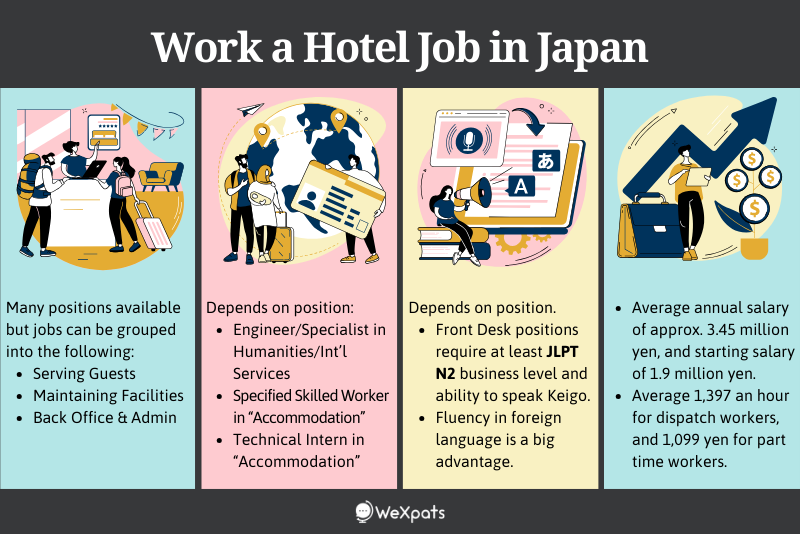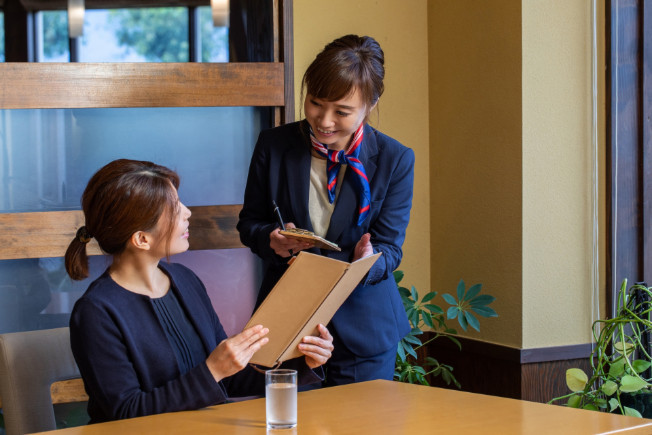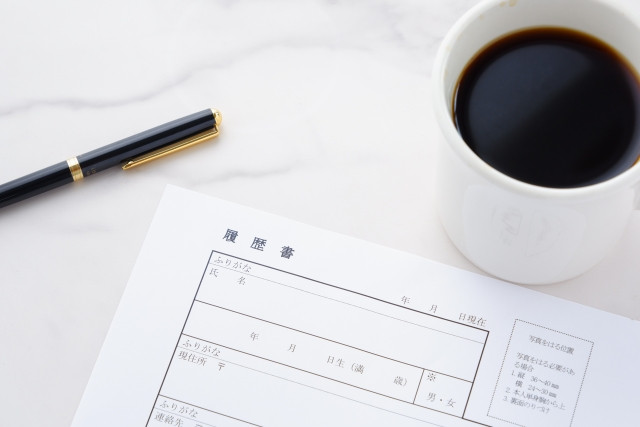Are you interested in working at a hotel in Japan? We’ve included a lot of information that you should know beforehand, from what to expect from hotel jobs in Japan, requirements, salary and even advice from our very own career advisor on how to successfully get the hotel job you want!
First Published: 2020/04/10
Updated: 2024/04/17
Table of Contents
- What Kind of Hotel Jobs Can You Get in Japan?
- The Perks of Working in a Hotel in Japan
- How to Work in a Hotel in Japan as a Foreigner
- Expected Salary Range for a Hotel Job in Japan
- Requirements of Hotel Jobs in Japan
- Tips on What to Write in Your Resume
- Find a Hotel Job via WeXpats
 Are you having any issues with job-hunting in Japan?
Are you having any issues with job-hunting in Japan?
What Kind of Hotel Jobs Can You Get in Japan?

In Japan, there’s a large variety of accommodation options, so what people imagine when they hear “hotel” may be quite different based on their needs. You can read about all the different types, from business hotels to luxury, traditional to modern, in our article here.
But when people think of hotel jobs, they often picture the front desk and welcoming guests.
Of course that’s one important job in a hotel, but there’s a vast range of other jobs as well! Hotels require numerous personnel but the jobs can be generally grouped into the following:
Serving Guests
This includes attending to them when they enter the establishment, answering inquiries and requests, generally providing the services of the hotel. Such jobs include front desk staff, hotel restaurant staff, staff in charge of various services offered by the hotel - room service, massage, gym, swimming pool, parking, etc. - and more.
In large hotels, there are also event planning staff for conferences, weddings, banquets and more. Japanese hospitality standards are extremely high - so all staff must conduct themselves and their tasks in an extremely professional manner.
Maintaining Facilities
This refers to those in charge of maintaining the cleanliness, aesthetic and overall condition of the hotel. Such jobs include housekeeping, groundskeeper, general maintenance (technician, engineer, etc.), and so on. Japanese hotels are particularly strict about maintaining pristine appearances
Back Office / Corporate Jobs
Often overlooked when considering hotel jobs, these positions are necessary to keep the hotel running smoothly, even if you are not necessarily always on-site or interacting with guests. This includes sales and marketing, administrative work, recruitment and hiring, general HR, etc. These types of jobs are the most versatile when it comes to transferable skills, so we’ll discuss these more later.
There are instances when assigned tasks may be from a mix of the above depending on the contract, or as in the case of many Japanese hotels, when employees (mainly fresh graduates) are required to train in all aspects before settling into their main duties.
Writer's Pick
The Perks of Working in a Hotel in Japan

Why work in a hotel in Japan? There are several great perks.
Use & Improve Japanese
If you work in a hotel in Japan, you will be using Japanese, not just with customers but with coworkers as well. By using Japanese frequently, you will be able to improve your speaking and listening skills - and if you work at the front desk or back office, your reading and writing skills as well. Not only that, conducting hotel service requires very polite service, so you will become used to speaking very correct and respectful Japanese. This level of keigo (formal Japanese) isn’t easily spoken without lots of practice - so this is an invaluable skill no matter where you go and work in Japan.
Learn Omotenashi
The high level and spirit of Japanese hospitality - called omotenashi - is known around the world. Working in a hotel means that you will not only be learning but also providing the highest quality service to guests. And not only that, as mentioned above, new employees are often assigned to do all kinds of tasks during training before settling into their main responsibilities, so you can get the full scope of the hotel’s service.
Transferable Skills
Many people think that once you work in a hotel, it’s hard to transfer those particular work skills to a different industry or to change jobs outside of the service industry altogether.
However, this is untrue. A full-time hotel job where you work the front desk would mean you would have a Engineer/Specialist in Humanities/International Services visa (housekeeping jobs would not qualify you for this visa). You could then, after working the front desk for a few years and improving your Japanese, apply for an internal transfer to the back office for administrative, marketing or sales jobs. The skills you would gain through these positions opens up your career options immensely.
Amazing Locations
This of course depends on what type of hotel you work at. Standard business hotels are located by stations in cities, and these may be the easiest to get a part-time job where you live. But there’s a variety of luxury and resort hotels across Japan - as well as traditional Japanese ryokan - which attract tourists both domestic and international. Working in such locations means experiencing life and attractions in places flocked to by visitors - whether that’s major cities, rural Japan, island resorts, etc. And some hotels will offer employees discounts, whether it’s to other branches of the same hotel chain, or to popular facilities in the region.
Shift Work
If you work in a hotel, your job will most likely be shift based. One of the perks of shift work is that oftentimes, you start early in the day and end early or start late and end late. What this means is that on weekdays, you have time to run errands that are difficult to do during the weekends. For example, most banks and post offices are closed on the weekends in Japan, and places like hair salons and hospitals are very crowded on the weekends. So you can get things done.
How to Work in a Hotel in Japan as a Foreigner

There are a couple ways that most foreign nationals begin working in hotels in Japan.
Study Hospitality
Japan has a lot of 専門学校 (senmon gakkou - vocational schools) dedicated to hospitality, the hotel industry and tourism. Many foreign nationals will first study Japanese at a language school, then transfer to a vocational school, continuing their Japanese studies while also learning skills for their future career. These schools are a great way to find a job in Japan, as most schools have connections to help find graduating students a job in that profession.
Learn more about studying hotel management in Japan here.
Part-time Job
Another path some take is working in hotels as a part-time job. People who take this route are often students, stay-at-home parents, and others looking to make income on the side. Some may simply continue on working part-time, while others may look into turning it into a full-time position and potential career.
Etc.
While the above two are the most common, there are other cases as well, as long as the person fulfills certain requirements, including language skills, experience, and more. Keep reading to see what they are.
Expected Salary Range for a Hotel Job in Japan

Salary greatly differs from location to location as there’s many things to factor in, including hotel type, location, years of experience, language ability, etc.
However, those working at the front desk as full-time employees can expect around 3 to 3.5 million yen per year. The range goes up the more experience you have. The number is a little lower for restaurant and housekeeping jobs.
The part-time salary also varies greatly depending on region and type of establishment and work, ranging from 900 yen to 1500 yen an hour - with potentially higher pay for night shift.
Requirements for Hotel Jobs in Japan

Each hotel will have their own set of requirements, especially for vacant positions, but these are the general requirements
Language Skills
One of the most important skills to have is the ability to speak Japanese. The level required varies from hotel to hotel, and the scope of your job, but having the ability to communicate is a must. Even for tasks not interacting with guests, you will need to be able to convey information to other members of the team.
In higher-end hotels, N2 level Japanese (business Japanese) and up is expected to work the front desk. This also includes the ability to speak keigo (formal Japanese). Not only do you have to talk directly to guests to assist them during their stay, you will also be required to fill out reports and share information with coworkers so that operations can run smoothly.
And of course, if you speak another language fluently, especially English, Chinese, Korean, etc., it is a big advantage as a job candidate.
Shift & Location Flexibility
Many hotel jobs are a shift-based system. This means that you might start early (but end early as well), or you may have the night shift. This also includes working on the weekends and public holidays (some of the busiest times for hotels!) Being able to adjust to such working times is a must. You will also most likely be on your feet for most of your shift, so being able to keep physically fit and healthy for work is also important.
Location flexibility depends on the position and hotel, but if you are looking for hotel jobs in general, you may have to be open to the possibility of working in various corners of Japan. The pandemic hit the hospitality industry hard, and hotels are just now hiring as more and more people from overseas are coming to visit. This means positions are opening up across Japan, so you may find yourself looking at a promising position in a location you never expected.
Also, certain hotels have many branches across a region, or maybe the whole country, so in some cases, you may be asked to (or may have the option to) relocate to another branch, whether temporarily or for quite a while.
Detail-oriented, Dedicated and Customer-first Mentality
We asked our career advisor what kind of people (personality-wise) are best suited for hotel jobs.
They listed out these as the top 3:
-
Detail-oriented: Japanese hotels offer a very precise service, and so people who work there must also be the same way. Whether you are working in housekeeping, the restaurants, in event-planning or marketing, all the small details must be accounted for. Everything is done following strict protocol, so being able to keep up with those standards is very important.
-
Dedicated: Working in a hotel is not an easy job, especially in Japan with its very high service standards, so whether it’s a part-time or full-time job, maintaining a serious attitude towards one’s responsibilities is necessary.
-
Guest-first Mentality: The third trait is being able to stand in the guests’ shoes and act accordingly. There are people from all over the country and world that utilize Japan’s hotels, and it’s important to understand their feelings and needs and do one’s best to meet those needs.
Tips on What to Write in Your Resume

Here are some tips that our Career Advisor suggested when filling out your resume for a hotel job in Japan.
志望動機 (Reason for Applying)
On Japanese resumes, there’s a section called 志望動機 (shibou douki) - the reason you applied for the job. It’s important to list the following:
-
Why you want to work at hotels (as opposed to other service jobs)
-
Why do you want to work at that particular hotel as opposed to the many others - it’s necessary to personalize each 志望動機 for each hotel that you apply to
-
Why you want to work at hotels in Japan as a foreign national - here, it’s important to include a personal experience, such as experiencing such amazing service at a Japanese hotel you visited that you wanted to do that same and help other people from overseas experience that level of amazement or show how amazing Japan is to people from your country
Qualifications/Certifications, Job Experience
As one’s resume and application determines whether you move on to the interview stage, it’s important to list out all the advantages you can offer to the hotel. Qualifications/Certifications can be listed under 資格 (shikaku). Past job experiences that show your ability to do well in the service industry, even if you don’t have experience working in hotels, should be listed under 自己PR (jiko PR).
-
Language ability - List out all the languages you can speak (at least at a conversational level and especially ones you are native-level in). Writing your JLPT level is a must, as most have a minimum requirement one must meet. Add in any certifications in other languages, such as a TOEIC score.
-
Driver’s license - It may seem strange to list this out under certifications, but this is important especially in rural areas.
-
Past job experiences - List any experience you have in the service industry, whether it’s food & beverages, event planning, etc. that shows you have some general knowledge about and ability in customer service. Or list anything that shows your attention to detail, your people skills, etc.
For general tips on how to write a resume in Japan, check out our article here.
Find a Hotel Job via WeXpats
WeXpats is a job site for foreign nationals that allows you to search for jobs by location, Japanese level, etc. We have several hotel jobs listed and more that our career advisors can recommend to you based on your credentials. We can also offer more advice about your resume, about what to say in the interview, and more! But the biggest reason you should choose us when looking for hotel jobs? We have success stories of getting someone their dream hotel job!
Read about how the pandemic put Vo Thuan Danh’s plans to work in a hotel in Japan on indefinite hold, but he was able to finally find the job he was looking for by consulting us!
And also read about Kim Youn A who wanted to work in Tokyo but ended up at Miyakojima that's nearer to Taiwan than Tokyo, but was finally able to get a hotel job in Tokyo after consulting us!
Here’s some more about WeXpats!

WeXpats operates a service for foreign nationals who want to work in Japan. There are jobs in a variety of industries including all kinds of hotel jobs. There are 2 services available on WeXpats - WeXpats Agent for full time jobs and WeXpats Jobs for part time jobs.
Looking for a Full Time Position? Leave it to WeXpats Agent!
WeXpats Agent is a career support service that specialises in employment for foreign nationals living in Japan.
Recruitment agencies in Japan are a service where dedicated career advisors will assist you with your job hunt for free. In addition to introducing open positions, we also provide support to help you create your Japanese resume and practice for interviews. Worried about job hunting in Japanese? We are here for you.
Features of WeXpats Agent
-
We have many job openings that are a good fit for foreign nationals to work in, such as translation, interpretation, inbound, etc. jobs that make use of your language skills, as well as engineering etc. jobs that do not require Japanese skills.
-
Our career advisors support and help you prepare your resume and practice job interviews with you. Clearly communicate your strengths to the hiring company.
-
We will handle communication with companies on your behalf, such as arranging interview dates and negotiating conditions. And thereby reducing your stress and time spent.
Finding a Part Time Job? Browse on WeXpats Jobs!

WeXpats Jobs is a part time job site for foreign nationals living in Japan. You can search for jobs in 11 languages (English, Vietnamese, Korean, Indonesian, Traditional Chinese, Simplified Chinese, Burmese, Thai, Spanish, Portuguese), including Japanese. Find jobs that suit you by specifying your Japanese language level, occupation, location, and etc.
※ You can register from outside Japan, but only those living in Japan can apply for jobs.




































